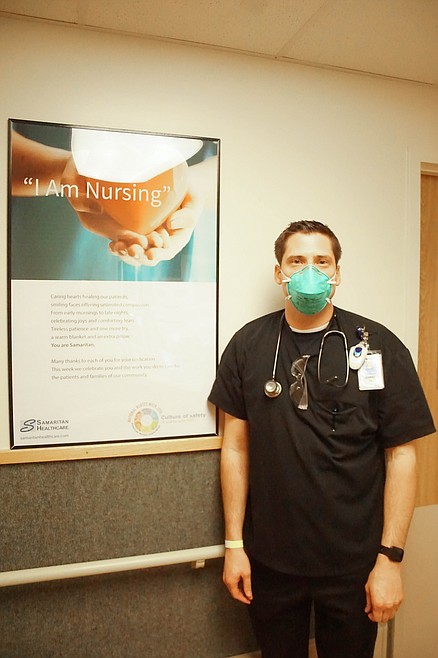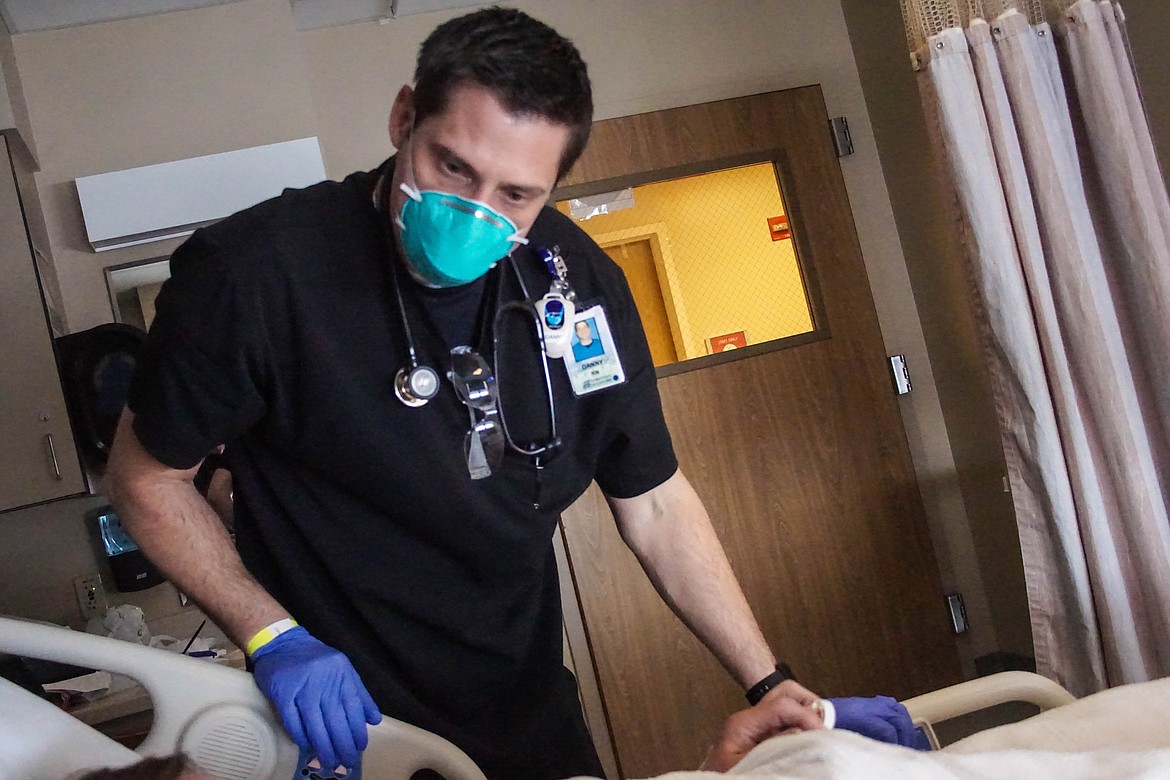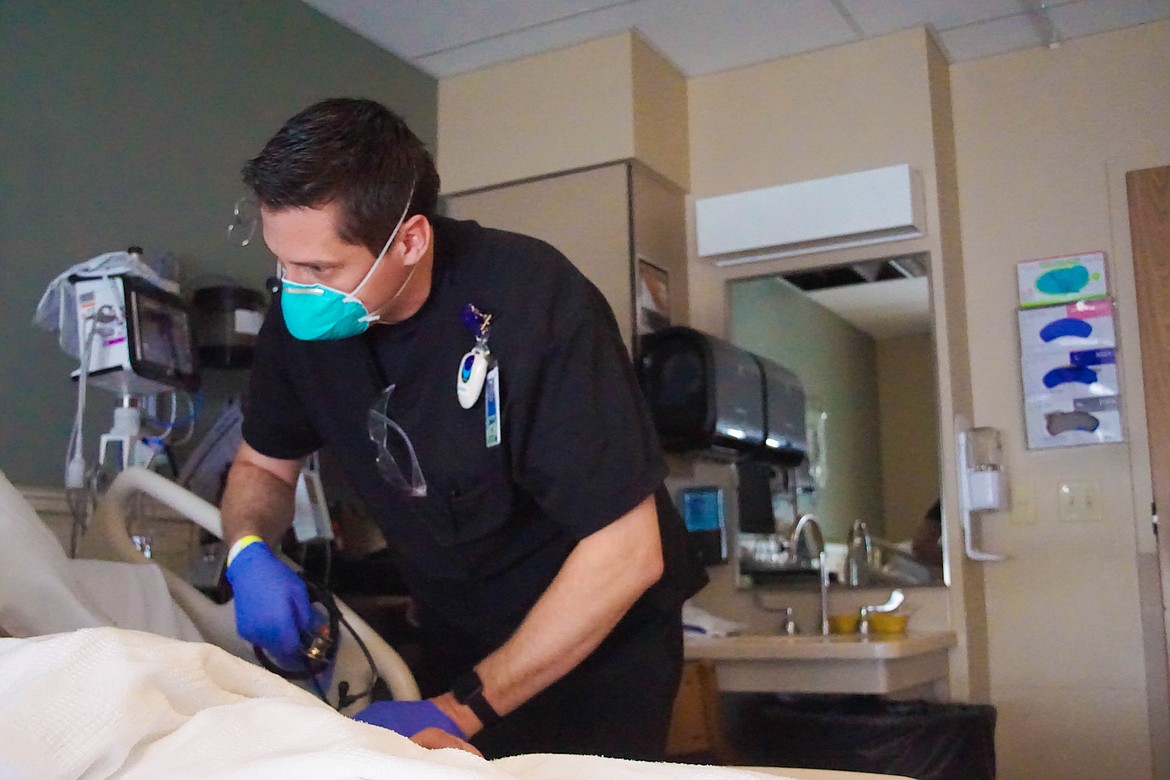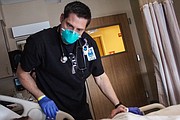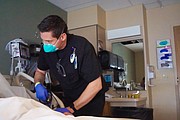‘All I know’: Reflections from a nurse who started his career mid-pandemic
MOSES LAKE — “It’s all I know,” said Danny Tracy, a nurse at Samaritan Hospital on East Wheeler Road in Moses Lake, “What it’s like to nurse in a pandemic.”
Tracy joined Samaritan’s team, working primarily on the medical surgical and intensive care unit floors, fresh out of Big Bend Community College’s nursing program, in July 2020.
Four months into a global pandemic.
At 33 years old, Tracy began taking his nursing prerequisites in 2017. Little did he know, he would end his education virtually due to COVID-19 — a virus he was studying to fight against in the field.
“Talk about crazy luck, right? It was such an irony,” Tracy said.
Nursing is Tracy’s second career, he said. He grew up in Boise, studied business management at Brigham Young University in Utah, then went to Dallas to work for Southwest Airlines. When he moved to Moses Lake to be closer to his wife’s family, he worked on a farm and as an accountant.
After two years, he decided to return to school.
“I wanted to do something where I helped people improve their health and well-being,” Tracy said. “I just felt like internally that’s just something that was a personal motivator for me, a motivator to get up every day and go to work. I was helping people with finances and money, but that just wasn’t what I wanted to do with my life.”
Tracy is a father of a 7-year-old daughter, a 5-year-old daughter and a 3-year-old son, he said. He and his wife are expecting a newborn in April.
With three kids at home, he found enough solitude to study in the library. The last few months of his education, it was shut down. He participated in his remaining lectures online and took his tests at home.
The upside, Tracy thought, with hospitals in dire need of support, he’d be a shoo-in for work. Unfortunately, the opposite came true.
In the beginning months of the pandemic, to conserve personal protection equipment, hospitals refrained from elective procedures. This meant tight budgets and nurses on leave.
“It was hard for me to even finish my on-the-job training hours because the nurses I was assigned to were on furlough,” Tracy said.
Luckily, he found a home at Samaritan. There, his opportunities and worries continued.
COVID-19 patients are sometimes in the hospital for two or three weeks, Tracy said. They can’t leave their room or have visitors.
It’s a sensitive balance, he said. He wanted to be there for them because they were lonesome, but they also have an infectious disease staff are trying to keep from spreading to other people.
Tracy spent a lot of time monitoring respiratory statuses, he said. He’s had patients go from a morning with no issues to an evening in the ICU.
“This person is now struggling to breathe,” Tracy said. “They’re breathing very fast, but they’re just not getting enough air into their lungs and their body, so it can be a very stressful experience, just watching somebody struggle to breathe.”
Bringing the virus home to his family became his new worry, he said. But he wears the proper equipment and follows the protocols, and so far he and his loved ones have been safe.
Mental fatigue has proven to be Tracy’s biggest overall struggle, he said. COVID-19 patients require more PPE and more attention. Some weeks, they’ve had a packed waiting room and fewer staff due to the virus. It’s been stressful, to say the least.
What helps him through is remembering why he studied nursing in the first place, he said.
“It’s good to take care of yourself because you have to take care of yourself to take care of other people, but trying to gain the perspective of this is what I signed up for, to help other people,” he said. “We’re in a pandemic where people are having trouble breathing and are really sick and need professional medical care, and this is why I signed up to do it.”
Since Tracy started at Samaritan, the visiting policy has changed, with more allowance as time goes on, he said. Many testing options have rolled out, too. And now, of course, vaccinations have begun.
“It just adds some comfort and some hope that maybe we’re starting to get a handle on this thing,” Tracy said. “It’s not just week after week it’s the same thing, just hoping to hold on, hope we have enough beds for people and just hoping it just kind of goes away.”
This sentiment is shared across the hospital, said Gretchen Youngren, Samaritan’s executive director of development and communications.
“We’re almost at a year from when this all began, which is kind of crazy to look back and think about,” she said. “It feels like we’re finally having resources to bring us out of the fog with the vaccine. Even with it being difficult and going week to week pending our state’s allocation, it feels like every day is a step in the right direction.”
Tracy is optimistic about a functioning vaccine, he said. He believes as months, progress fewer people will get sick, and things will go back to how they were before March 2020.
Through it all, Tracy is just as passionate as his first day, he said.
“I really enjoy what I do. I enjoy being a nurse. I enjoy working with patients. I don’t feel that that’s changed because of the pandemic.”
He’s in it for the long haul, he said.
“I’m just a brand-new nurse. I have tons and tons to learn. I still have the fire and the passion to keep going,” he said. “I have the faith that we’re not going to be living in a pandemic condition for my whole career.”
Sam Fletcher can be reached via email at [email protected].

